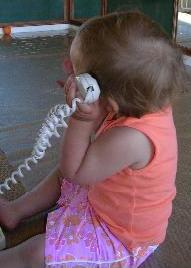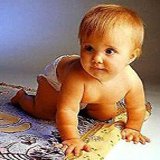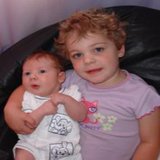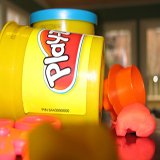Baby Language - What can YOU do to enhance it?
When it comes to baby language, it is important to keep in mind that each child develops language at his own pace.
Language development has two dimensions, the first one that develops is receptive dimension. That is the comprehension of words, in other words the ability to understand what is said. The second is expressive dimension, which are the words the child uses to express himself.

Baby Language Progression is:
- Cooing
- Gurgling
- Babbling
- Individual words
- Two-word sentences
- Complex sentences
From 18 months they start using around 20-50 words. They understand a lot of words, can follow two-step commands and start making two word sentences. They love nursery rhymes and songs and listen to short stories. They can point to 6 body parts.
By 12 months the child recognizes and responds to his name. They babble loudly and sometimes their babbles sound like real language with variations in volume and tone.
At this age they start to repeat words and imitate sounds. They can identify pictures in books and respond to one-step commands, e.g. give me the block
How to Encourage
Language Development:
- Read a lot to them using picture books and flash cards.
- Tell a story using masks or by having puppet shows.
- Ask questions, e.g. Show me the dog, where is the cat?
- Imitation; dont use baby language, speak normally.
- Play word games using actions.
- Give them feedback, e.g. You are hungry/thirsty etc.
- Eye contact is important to keep the childs attention.
- Use describing words such as: Hard, soft, loud, noisy, sad and happy.
- Sing songs, or say nursery rhymes.
- Play them different sounds like, a train, an aero plane, a car, a bus, footsteps, animal noises, a clock etc.
- Keep sentences short and simple.
Some More Language Development Tips:
- Play different kind of music.
- Make loud and soft sounds.
- Talk or sing to them in different voice tones through a tube.
- Play with all kinds of musical instruments to help them distinguish between different sounds.
- Teach them all the different animal sounds.
- Provide your classroom with a few unused telephones and encourage them to phone someone, like granny.
- Squeeze the toddlers nostrils when you say this is my nose.
- Smack your lips when you say this is my lips.
- Stick out your tongue when you say this is my tongue.
- Bat your eyelashes wildly when you say these are my eyes.
- Do the same with all the other body parts.
Discover the secret of language development in children:
Infant language development - Learn to interpret your infants sounds and cries and respond to his/her needs quickly and effectively.
Toddler language development - The more you listen and respond to your toddler, the better he/she will become at communicating with you.
Repetition is very important in baby language development and learning baby to talk.
Be sure to browse through all the language development pages that is broken down in different age groups.
Read more about the different language development stages.
Find It!
Can't remember where you read something specific? Just type in your search term in the box below and your specific topic will be returned to you instantly.









